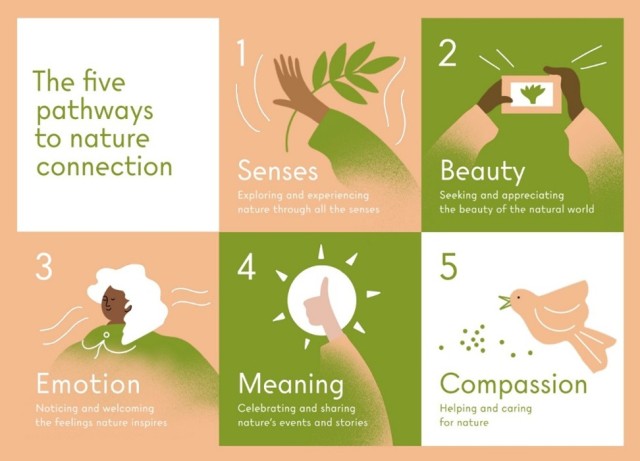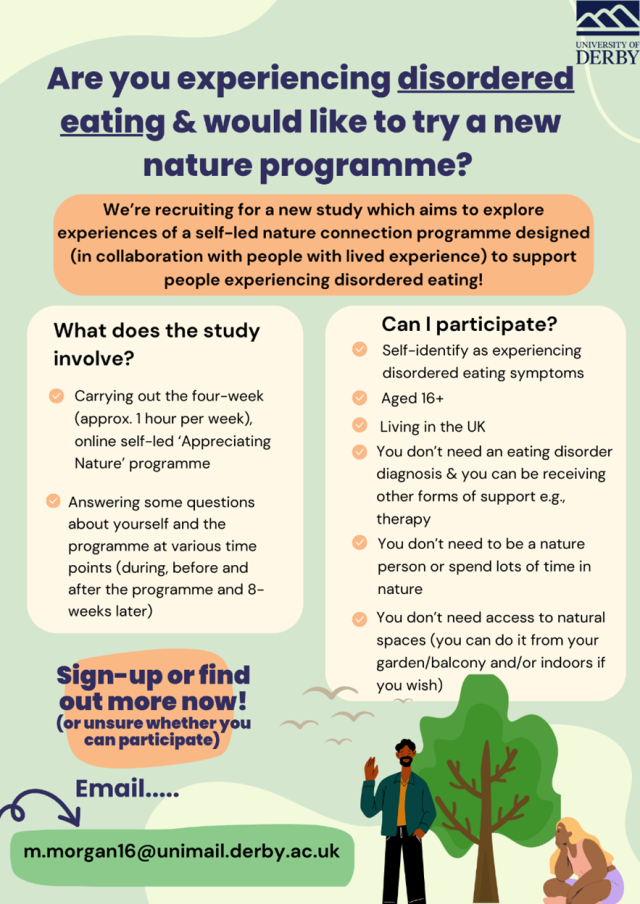A guest blog by Mia Morgan
At the start of my PhD, I wrote a blog questioning the role nature connectedness could play in supporting people experiencing disordered eating (DE). I also outlined the ways I planned to develop a programme encouraging nature connection, specifically for people experiencing these symptoms. Two years on and I’m thrilled to have learnt about the wide range of ways nature connection can support this population and used this information to develop a prototype of the programme. This blog will briefly take you through this journey and then introduce some exciting opportunities for both people currently experiencing disordered eating and for professionals interested in incorporating nature into their DE services/practice.
I will not detail specific findings from my PhD studies, in an attempt to avoid leading anyone who would like to take up the opportunities below.
The first stage of this project was about understanding what research and knowledge already existed around how nature can support disordered eating recovery. This is why I carried out a review of current studies in this area. I’ve submitted this review for publication, so it will hopefully be available to all soon. Here, I started to build a picture of the various ways nature could influence different aspects of eating psychopathology. What I found interesting was that nature connection was involved in nearly all of these mechanisms, but a nature connection intervention specifically for people experiencing DE was yet to be designed.
There was still more to learn on this topic however, particularly because of the lack of research into first-hand perspectives and experiences of how nature can be a part of people’s recovery journeys. Therefore, to explore this, I carried out fifteen interviews with people with lived experience of disordered eating and five focus groups with professionals who support this population. The results were unbelievably insightful. Though I cannot detail specific findings on the ranging benefits nature can have for this population, I can say that (after reviewing previous literature and listening to the experiences and views of participants) as well as being a potential way to manage DE symptoms, nature connection can broaden people’s perspectives beyond the narrow focus on themselves and their DE thoughts. This can encourage people to see a life beyond these worries and feel a part of something much bigger. Engaging with nature gives people permission to refrain from ‘doing’ or ‘achieving’, encouraging the act of being a little bit more in the moment.
Another, exciting part of this project was (during the abovementioned interviews and focus groups) asking people how an optimal nature connection programme for this population would look. In other words, the design of the programme… would a 1:1, group or self-led format be better? Was there anything that would put people off engaging completely? What would optimise people’s ability to want to be involved and stay engaged? Again, these findings were brilliant and showed various ways a nature programme could be designed for this population.
Although, I cannot disclose too much yet, I can say that the programme we have designed uses a self-led format. It adopts the five pathways to nature connection (see image below), giving people simple weekly activities that can be easily incorporated into their everyday lives, including at times which feel tough. All the activities are designed or adapted specifically for people with DE. Opportunity for choice is incorporated, including choice of the activities themselves but also when and where these are carried out. There is no need to travel anywhere special to perform the activities, they can be done in people’s gardens, balconies, local park etc. Some activities also have versions that can be carried out indoors. There are also invitations to reflect on experiences related to the programme. Centrally, this a very inclusive programme, that does not discriminate in terms of how severe someone’s DE symptoms are or how much experience they have in engaging and connecting with nature. It meets people where they are and welcomes everyone!

Opportunity 1- for people currently experiencing disordered eating:
Would you like to try out an early version of the programme I have described above? Or are interested in finding out more? I’m very excited to say that we are now inviting people who self-identify as experiencing disordered eating (of any severity, you don’t need to have an eating disorder diagnosis) who live in the UK, to try out a 4-week self-led nature connection programme!
This study is delivered online, so you can live anywhere in the UK. Each week you will be invited to carry out several short, simple activities designed to connect you with nature (like I have described above). Activity instructions are simple to follow and are delivered through videos and in writing to ensure you feel supported when carrying out the programme. You will be asked some questions before, during and after the programme, to help with the continued development of the programme!
So, if you are intrigued by the idea of adding nature connection to your coping mechanism toolkit and trying something slightly different, then please consider taking part in this study.
Please email me if you are interested, have any questions or would like to sign up- m.morgan16@unimail.derby.ac.uk
See more information on this opportunity in the flyer below.

Opportunity 2- for professionals interested in/currently incorporating nature into their DE services/practice:
If you are integrating nature into the support you provide people with disordered eating, or are interested in doing so, I would love to hear from you! I’m currently in the early stages of planning ways to build a community of like-minded individuals working in (or inspired by) this space 😊
Please email me- m.morgan16@unimail.derby.ac.uk